Die Hard Is the Story of a Cop Learning to Kill Again
Dice Difficult is one of the near celebrated movies of all time, making it onto almost every listing of the best action movies e'er made. Information technology also jump-started the career of Bruce Willis with his performance equally NYPD officer John McClane, the wise-cracking lowest that America couldn't help but fall in beloved with. While Dice Hard spawned four sequels in 25 years, critics and fans akin concord that none of the later films in the franchise accept fifty-fifty come up shut to the original. Yet, there's a instance to be made that Die Hard is the worst in the franchise while the most maligned is actually the best.
Scoring only a 15 per centum on Rotten Tomatoes and a 28/100 on Metacritic, 2013'south A Practiced Mean solar day to Die Difficult is the worst-ranked Die Difficult picture by a huge margin, virtually to the signal where information technology seems like it's not even worth watching. Just avoiding A Proficient Day to Dice Hard would be a mistake, every bit information technology not only has the best action set-pieces of the franchise but surprisingly has the virtually honest depiction of McClane so far.
Taken for its activeness scenes lonely, in that location's something refreshing about A Skilful Day to Die Difficult. Especially later the rightfully-maligned jet punching scene in Alive Free or Die Difficult, information technology's a breath of fresh air to find McClane stripped of the superhero status he gained over the by three movies. That's non to say that he doesn't get up to whatsoever elaborate stunts, but at that place is a groundedness to his action that reminds audiences of the fire hose jump from Dice Hard rather than when McClane shoots a machine at a helicopter in Live Free or Die Hard.
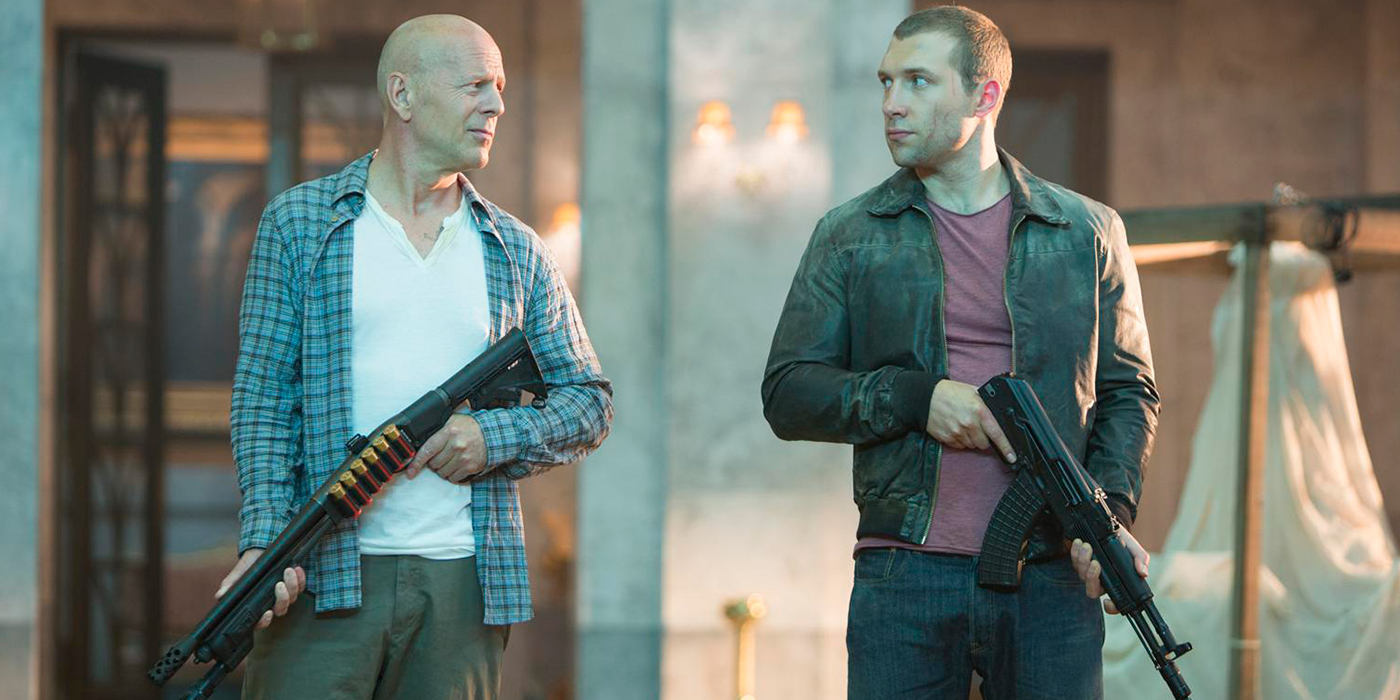
Director John Moore employed this fashion throughout the entirety of A Good Day to Dice Hard, using CGI sparingly and so that the film's action really stands out, especially when compared to an era that was becoming more and more defined by a digital slickness, as seen in films similar Iron Man 3, World War Z and The Hobbit: The Desolation of Smaug, which all came out in the same year. There's a perfectly paced 20-minute sequence almost the beginning of A Good Day to Die Hard, effortlessly moving between gunfights in buildings and car chases on the decorated streets of Moscow, that carries a kinetic excitement not seen since Bad Boys Two-era Michael Bay or Paul Greengrass' The Bourne Supremacy.
And within all this, A Skilful Solar day to Dice Hard firmly remains a Die Hard movie, both nodding to and one-upping the most memorable scenes from Die Hard, from the rooftop explosion to the glass shattering sequences. While this is some bully franchising on its ain, it, more importantly, offers a stark dissimilarity between the two versions of McClane separated by 25 years. And information technology's not for the better.
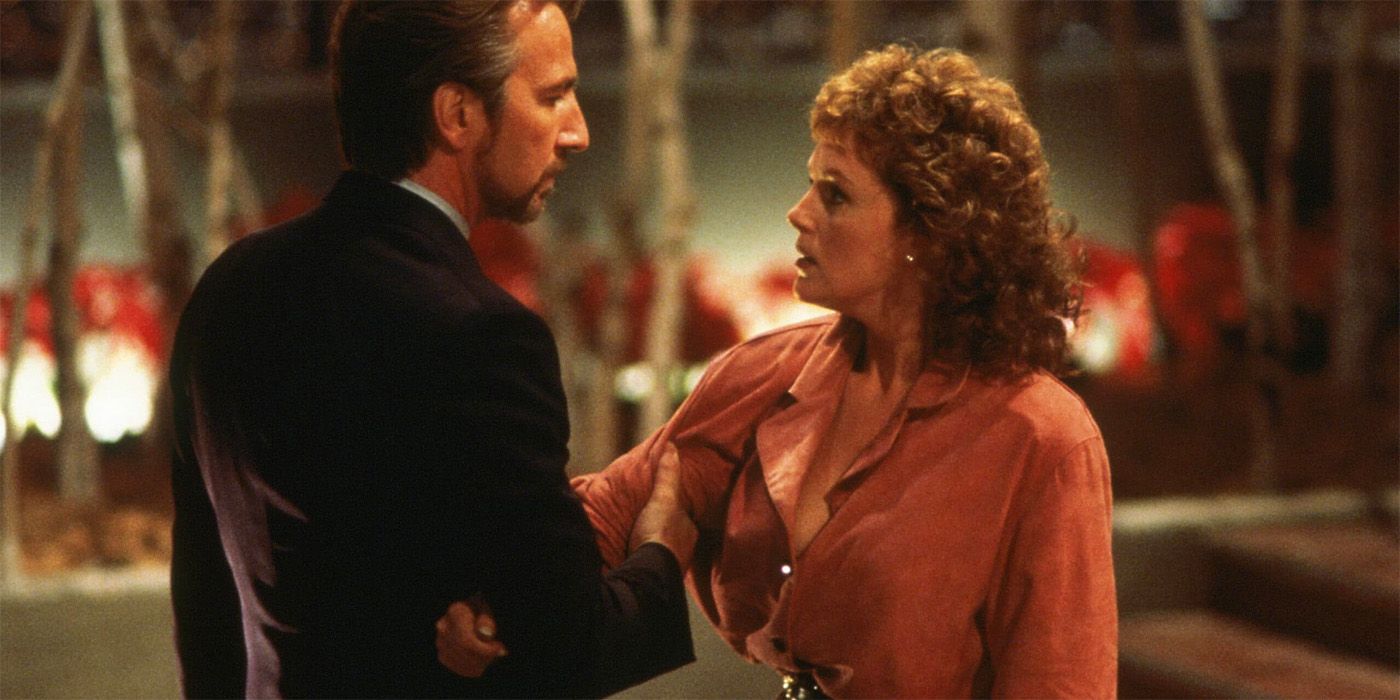
There is a rotten cadre to the Die Hard franchise that, upwardly until A Good Mean solar day to Die Hard, is at worst celebrated and at all-time ignored, and it is found at the middle of who McClane is as a character. Die Hard, the 2-word phrase found in each of the films' titles, is a term that describes someone fanatical, devoted and strongly resistant to alter, so it is no surprise that McClane adopts the cultural attitudes of the American Western for his personal identity, not just in his famous "Yippee-ki-yay" catchphrase but besides in how he behaves and what he represents, hearkening back to an era of unmasked American colonization, genocide and misogyny. This is all-time seen in the two most important relationships in the film, with his wife Holly and LAPD Sgt. Al Powell.
Dice Hard opens with McClane leaving New York to visit his wife, Holly Gennaro, every bit she had moved away from him with their two children to start a career in Los Angeles. Subsequently learning she has gone back to using her original last proper name and is thriving in her position with the Nakatomi Corporation, John picks a fight with her that pinpoints the fragility of a man confronted with a potent woman. Because what does John have to offer her anymore, other than kittenish outbursts and a penchant for violence? Thankfully for John, the statement is cutting off unconcluded, and the two never talk to each other once again.
This marital silence is a fascinating pick, specially for a movie pretending to exist a romance. After their statement, John kills everyone, and the pair are reunited as she is held hostage by criminal mastermind Hans Gruber. This could take been a moment of relief, where the audience feels their beloved, but Holly only looks at him with a mix of pity and disgust while muttering, "Jesus," and John quips, "How-do-you-do, honey," as though returning home from work in a 50s sitcom. The scene ends in apparent heroics, equally John kills the final "bad guy" and rescues his wife, simply the details of this scene unearth the inherent misogyny of the franchise.
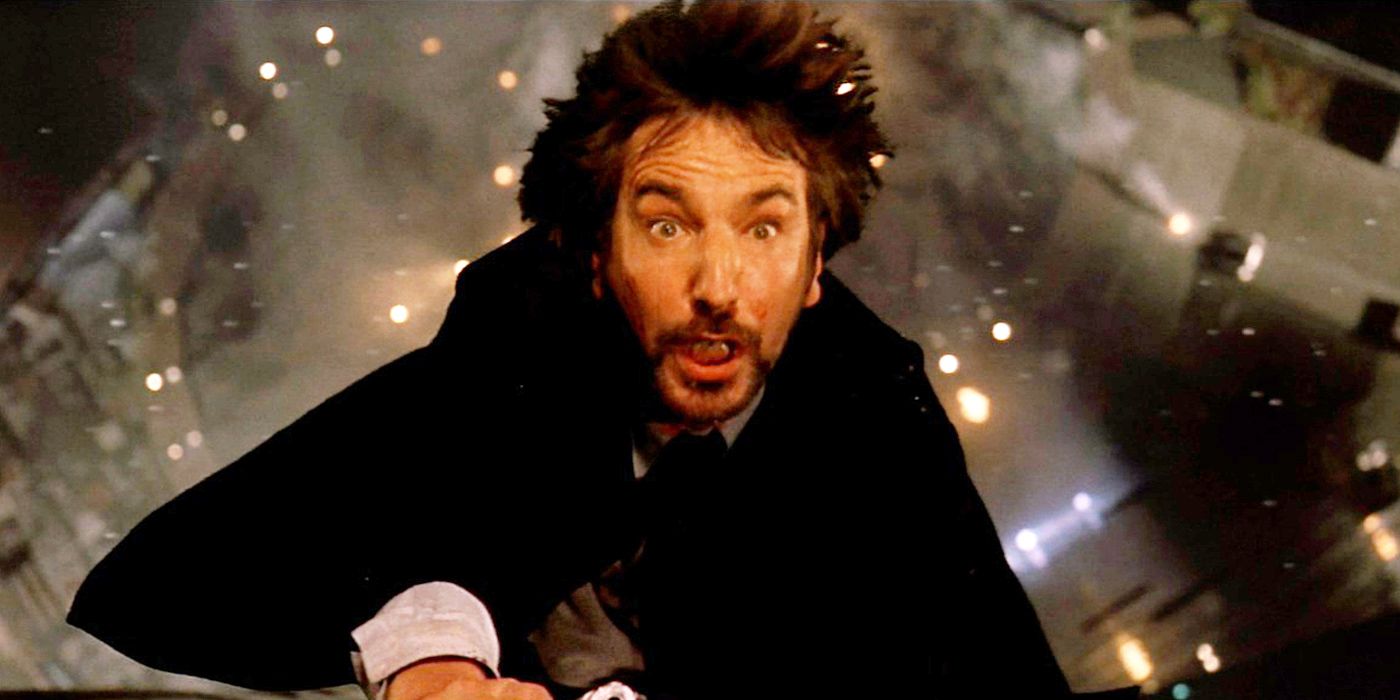
Equally Gruber dangles out the window, he clings to Holly in a desperate attempt to salve himself, but he isn't holding onto her wrist but instead grabs the watch that she was given for her incredible operation in her career, the watch that represents her independence, her success, everything that is hers, and as John releases the clasp it disappears. Here, information technology is articulate that John never had whatever intention of apologizing to Holly -- he doesn't past the fashion -- only just in winning the argument every bit only he knows how.
And then, if the main relationship of Die Hard isn't between John and Holly, who takes on that part? That would be Sgt. Al Powell, a member of the LAPD, who had been moved to a desk after shooting and killing a kid while on duty. The well-nigh tender scenes in the movie are actually between these two cops, equally they chat throughout the entirety of the heist via radio. They call each other baby, share stories of their pasts and support each other as they each endure concrete and emotional pain. In a scene that should have been between John and Holly, John apologizes for his behavior and promises to be more supportive, just he says all this to Al, a cop he'due south never seen earlier rather than to his wife, the person he has hurt.
Perhaps Dice Hard is best watched equally the fantasy of the male person chauvinist, a story of a man who finds solace in terrorist attacks -- fifty-fifty imitation ones -- because they are the just identify left where he feels in control, where his violence and uncaring can really take shape in a modern world that is ill of his behavior. McClane becomes some perverse Ghost of Christmas Past -- certainly not the Present or Future, equally he has already established himself a relic from the foretime era of cowboys -- forcing the world to devolve to his version of American idealism. Anyone John considers a "bad guy" he kills, not just Gruber's ring of thieves simply too Ellis, the mod, coke-fueled businessman, and the Johnsons, ineffective, bureaucratic FBI agents.
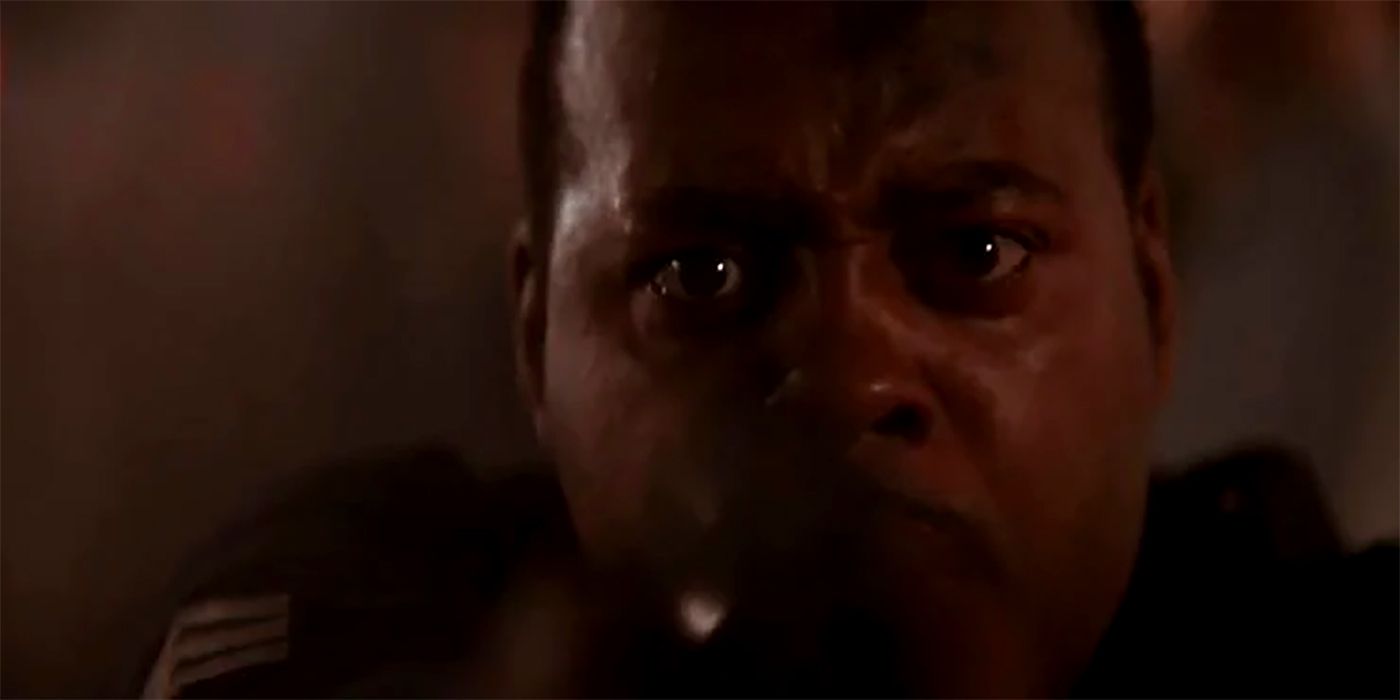
Simply the worst of John'south behavior isn't in who he kills but in who he claims to rescue. By the terminate of Dice Hard, Holly no longer has her career, readopts McClane equally her final name and is told by Powell: "You got yourself a good human. Yous have good intendance of him." Meanwhile, Powell'due south large moment arrives with a crescendo of celebratory music equally he finds the gumption to choice up his gun and kill again. The triumph at the end of Die Hard isn't the thwarted heist or even in John and Holly getting back together: John'south nightmarish version of America has been restored when a woman is dragged back to being nada more than a wife and a cop is unleashed once again as a killer
This is why Die Hard is the worst of the franchise: because of what it represents and what it celebrates, so enthusiastic in elevating McClane to the status of a hero, it is difficult not to read the pic every bit a satire of American misogyny and violence. Merely McTiernan has been clear in interviews that this is an earnest testament to what he believes is honorable, so the parody must only be seen in retrospect as the only way to stomach this vicious tale.
This is besides what makes A Proficient Day to Die Hard the best of the series, not in what it changes merely in what it retains. Twenty-five years accept passed, but McClane hasn't changed at all; nonetheless wise-cracking, still killing "bad guys." His age makes him look exhausted, and his quips fall flat, sometimes repeating the same joke multiple times as though no i heard him or he has nothing left to say. He's divorced and has spent the concluding ii movies trying to earn back the love of his children, and it is here that A Skillful Day to Die Hard succeeds, non attempting to redeem McClane for the 21st century but only showing him as he is and has always been: a violent, unpleasant old man that no 1 wants to be around.
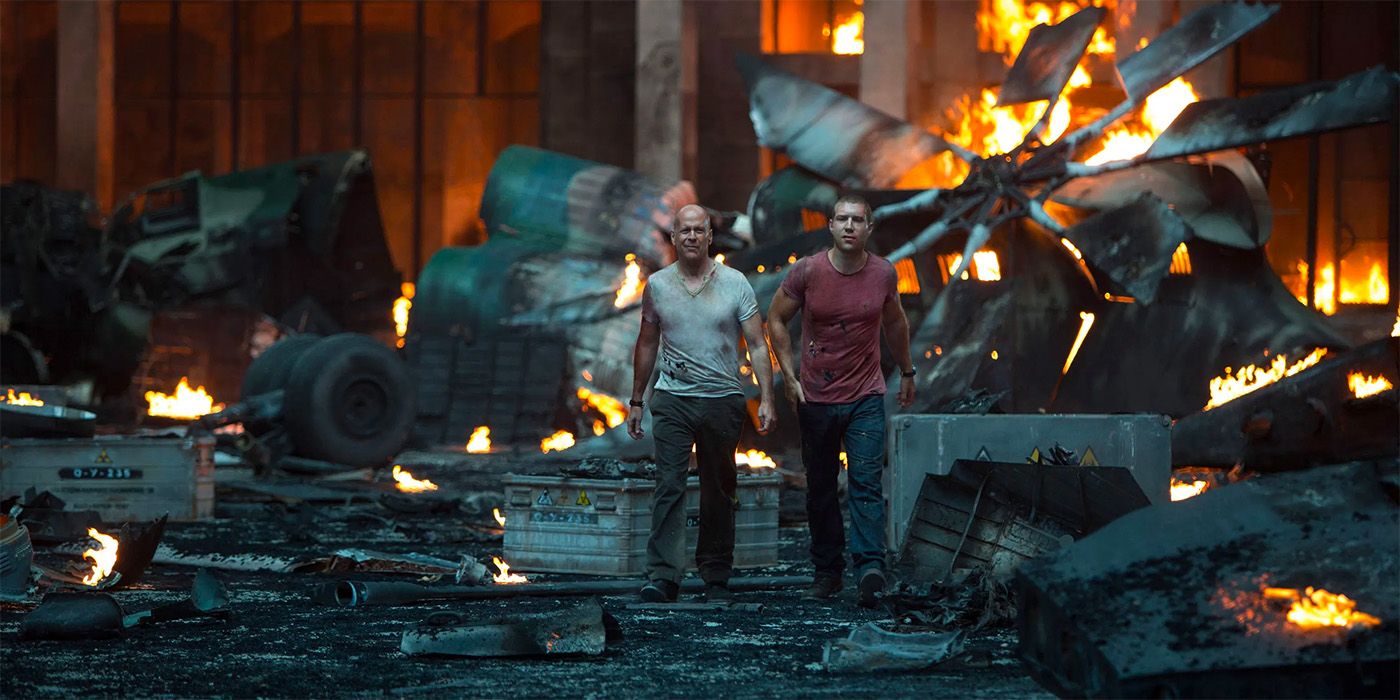
And it is this unlikability of McClane that is simultaneously the reason why A Good day to Die Hard was panned on its release and why it is ultimately the all-time Die Hard movie, with its failure as a film directly due to an audience finally coming to terms with who their supposed hero really is. McClane isn't a hero, not even an anti-hero, rather a vicious oaf ruled by anger and violence, a person abandoned and solitary, a human who cannot fifty-fifty expect his ain son in the eyes when he says "I beloved you," equally though still a boy, embarrassed and afraid.
Like all Dice Hard movies, Good Day seems to cease in triumph: the "bad guys" are dead, and McClane limps off into the dusk with someone he'southward supposed to love but is not sure how. The emptiness captured in the final moments of A Cheerio to Die Hard is the most fitting end for McClane, and while his antics are the same as in the other four films, there is no longer any triumph left, just some other march from the carnage, the perfect shut to a franchise dedicated to American dread.
Virtually The Writer
Source: https://www.cbr.com/a-good-day-to-die-hard-best-franchise-film/

0 Response to "Die Hard Is the Story of a Cop Learning to Kill Again"
Post a Comment